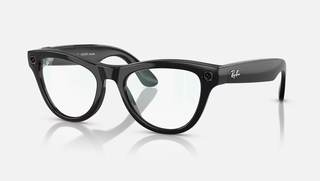Meta smart glasses
A factsheet on Meta's smart glasses - what they are and what they do.


Summary
Meta smart glasses (called Ray-Ban Meta Smart Glasses) are a collaboration between Meta (the company behind Facebook and Instagram) and Ray-Ban. They’re designed to look like regular, stylish sunglasses or clear-lens scriptable glasses - but they’realso mini tech devices you wear on your face.
What can they do?
These glasses have several built-in features designed to keep your hands free while staying connected:
Take photos and videos: They include a tiny 12-megapixel camera that lets you snap pictures or record videos from your point of view - just by tapping a button or using your voice.
Listen to music and make phone calls: The glasses have open-ear speakers (so your ears aren’t covered), allowing you to listen to music or take calls while still hearing what’s happening around you. The speakers are designed to direct sound toward your ears while keeping it fairly private, but they’re not completely silent to bystanders if the volume is up.
Use voice commands: They come with Meta’s voice assistant, so you can say things like “Hey Meta, take a photo” or “What’s the weather?” without needing to pull out your phone.
Livestream to social media: If you’re active on platforms like Facebook or Instagram, you can livestream directly from your glasses.
Who are they for?
Meta markets these glasses to people who want to stay connected and capture life’s moments without looking down at their phones. They’re targeting active, social users - people who walk, cycle, travel, attend events, or just enjoy tech.
They’re not specifically made for people with low vision or blindness, but some features (like voice commands and hands-free video calls) can be useful in an accessibility context - especially when paired with apps like Be My Eyes.
Why are they different?
Unlike other “smart glasses” that might look bulky or tech-heavy, Meta has focused on making theirs stylish and comfortable. They want them to feel like an everyday accessory, not a piece of medical equipment or a gadget. This article focuses on Meta smart glasses specifically and does not compare them in detail with other smart glasses on the market. That’s because many alternative products are either no longer supported, difficult to access in Australia, or have shifted focus away from vision-related features. We aim to provide honest, practical insights into the tech people are currently asking about - without overwhelming readers with options that may not be relevant, available, or reliable. If you’re aware of any new technology that you’ve found useful or would like us to review, we’d love to hear from you.
Did you find this article helpful?
Share your thoughts and help us make our resources better for everyone.
Enjoying the content?
Start building your profile to access personalised support, resources, and tools tailored to your eye health journey.
